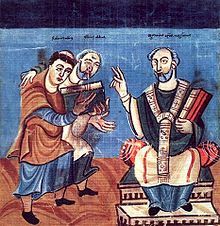Alcuin
Alcuin of York also called Ealhwine, Albinus or Flaccus was an English scholar, ecclesiastic, poet and teacher from York, Northumbria. He was born around 735 and became the student of Archbishop Ecgbert at York. At the invitation of Charlemagne, he became a leading scholar and teacher at the Carolingian court, where he remained a figure in the 780s and 90s. He wrote many theological and dogmatic treatises, as well as a few grammatical works and a number of poems. He was made Abbot of Tours in 796, where he remained until his death. The most learned man anywhere to be found, according to Einhards Life of Charlemagne , he is considered among the most important architects of the Carolingian Renaissance. Among his pupils were many of the dominant intellectuals of the Carolingian era.
Alcuin was born in Northumbria, presumably sometime in the 730s. Virtually nothing is known of his parents, family background, or origin. In common hagiographical fashion, the Vita Alcuini asserts that Alcuin was of noble English stock, and this statement has usually been accepted by scholars. Alcuins own work only mentions such collateral kinsmen as Wilgils, father of the missionary saint Willibrord and Beornred, abbot of Echternach and bishop of Sens, who was more distantly related. In his Life of St Willibrord, Alcuin writes that Wilgils, called a paterfamilias, had founded an oratory and church at the mouth of the Humber, which had fallen into Alcuins possession by inheritance. Because in early AngloLatin writing paterfamilias usually referred to a ceorl, Donald A. Bullough suggests that Alcuins family was of cierlisc status i.e., free but subordinate to a noble lord, and that Alcuin and other members of his family rose to prominence through beneficial connections with the aristoc
Source: Wikipedia

